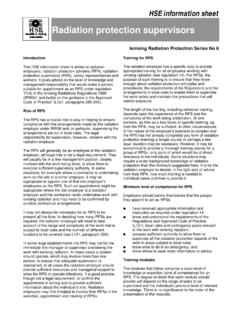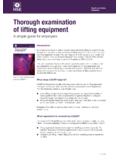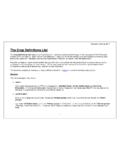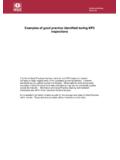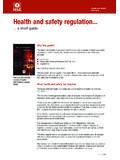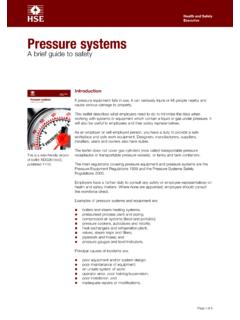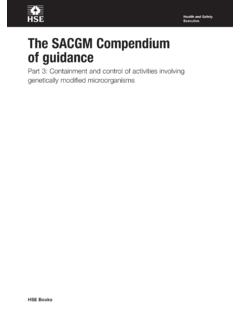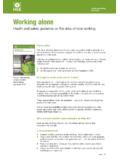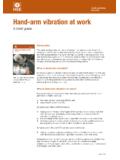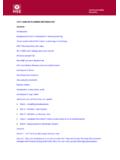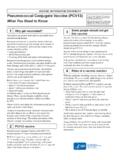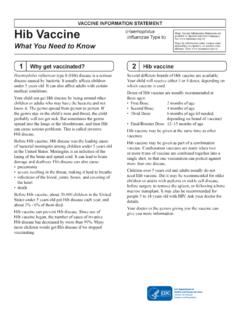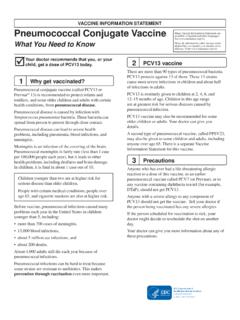Transcription of Reporting injuries, diseases and dangerous occurrences in ...
1 1 of 7 pagesHealth and Safety ExecutiveHealth and Safety ExecutiveHealth Services Information Sheet No 1 (Revision 3)HSE information sheetReporting injuries , diseases and dangerous occurrences in health and social careGuidance for employersIntroductionThis information sheet gives guidance on how the Reporting of injuries , diseases and dangerous occurrences Regulations 2013 (RIDDOR) apply to the health and social care sector. It is aimed at employers and others in health and social care, who have a duty to report under requires employers and others to report deaths, certain types of injury , some occupational diseases and dangerous occurrences that arise out of or in connection with work.
2 Generally, this covers incidents where the work activities, equipment or environment (including how work is carried out, organised or supervised) contributed in some way to the circumstances of the accident. RIDDOR reports alert enforcing authorities to events and helps them to decide whether to investigate serious incidents. Reports enable HSE or local authorities (the enforcing authorities ) to identify where and how health and safety risks arise, reveal trends and help target activities. Some incidents are not reportable under RIDDOR. But this does not mean that the general provisions of the Health and Safety at Work etc Act 1974 ( the HSW Act ) do not apply.
3 Depending on the circumstances, the enforcing authority may decide it is appropriate to investigate such incidents. This is more likely to arise where serious management failures have contributed to, or had the potential to cause, death or serious injury . What do you need to report?The following are reportable, if they arise out of or in connection with work : the death of any person, whether or not they are at work (see Section 1); accidents which result in an employee or a self-employed person dying, suffering a specified injury , being absent from work or unable to do their normal duties for more than seven days (see Section 2); accidents which result in a person not at work (eg a patient, service user, visitor) suffering an injury and being taken directly to a hospital for treatment, or if the accident happens at a hospital, if they suffer a specified injury (see Section 3).
4 An employee or self-employed person has one of the specified occupational diseases or is exposed to carcinogens, mutagens and biological agents (see Section 2); specified dangerous occurrences , which may not result in a reportable injury , but have the potential to do significant harm (see Section 4).Who should report?The responsible person has the duty to notify and report. This may be the employer of an injured person, a self-employed person or someone in control of premises where work is carried out. Who the responsible person is depends on the circumstances of the reportable incident (see Table 1). The employment status of agency workers is not always clear to the agency, the worker, or to the business supplied with labour.
5 In many cases, the employment agency is the legal employer, and is under the same legal obligations as any other employer to report accidents and ill health to their employees. In other cases, for instance where workers are self-employed, the duty is on the host business to report accidents, as the person in control of the premises where an accident occurs. In practice, agencies should ensure that responsibility for Reporting under RIDDOR is clearly assigned to the appropriate person based on the particular facts of the employment relationship. Agencies should ensure that Reporting responsibilities are clearly understood by the host businesses and different organisations share responsibility for managing staff, the employer is responsible for ensuring adequate arrangements are in place for Reporting incidents.
6 2 of 7 pagesReporting injuries , diseases and dangerous occurrences in health and social careHealth and Safety ExecutiveTable 1 The responsible personReportable incidentInjured personResponsible personDeath, specified injury , over-seven-day injury or case of diseaseAn employee at workThat person s employerDeath, specified injury or over-seven-day injuryA self-employed person at work in premises under someone else s controlThe person in control of the premisesSpecified injury , over-seven-day injury or case of diseaseA self-employed person at work in premises under their controlThe self-employed person or someone acting on their behalfDeath or injury which means you have to be taken to hospital for treatment (or a specified injury occurring at a hospital)A person not at work (but affected by the work of someone else), eg patient, volunteer or visitorThe person in control of the premises or, in domestic premises, the employer in control of the work activity dangerous occurrenceThe person in control of the premises where (or in connection with the work at which)
7 The dangerous occurrence happened Failure to report a reportable injury , dangerous occurrence, or disease , in accordance with the requirements of RIDDOR, is a criminal offence, and may result in prosecution. Reporting an incident is not an admission of to report Although the Regulations specify varying timescales for Reporting different types of incidents, it is advisable to report the incident as soon as possible. In cases of a reportable death, specified injury , or dangerous occurrence, you must notify the enforcing authority without delay. You must report within 10 days of the incident. Over-seven-day injuries must be reported within 15 days of the incident.
8 diseases should be reported as soon as a registered medical practitioner (RMP) notifies you in writing that your employee suffers from a reportable work-related disease . How to reportFor general advice on how you should report, see the RIDDOR pages on HSE s website: incidents can be reported online, however a telephone service remains for Reporting fatal and specified injuries only. Keeping recordsYou must keep a record of any reportable injury , disease or dangerous occurrence for three years. This must include: the date and method of Reporting ; the date, time and place of the event; personal details of those involved; the injury ; a brief description of the nature of the event or must still keep a record of all over-three-day injuries .
9 If you are required to keep an accident book, under the Social Security (Claims and Payments) Regulations 1979, that record can be treated as a record for the purposes of the Safety Representatives and Safety Committees Regulations 1977 and the Health and Safety (Consultation with Employees) Regulations 1996, employers must make relevant health and safety documents available to safety representatives. This includes records kept under RIDDOR, except where they reveal someone s personal health information. For further information on consultation, see Consulting employees on health and safety. Reporting requirements of other regulators Other regulators in the health and social care sector administer a number of Reporting requirements.
10 These are separate to and distinct from the legal duty to report incidents under of 7 pagesReporting injuries , diseases and dangerous occurrences in health and social careHealth and Safety ExecutiveSometimes regulators need to share information in accordance with their statutory responsibilities, especially where it may indicate a failure to follow legal responsibilities and put people at risk. Section 1: Deaths in health and social care You must report the death of any person, whether or not they are at work, if it is caused by an accident arising out of or in connection with work. However, under RIDDOR there is no requirement on anyone to report the death of: a self-employed person in premises where they are the owner or occupier; or an employee which occurs after one year from the date of the accident.
